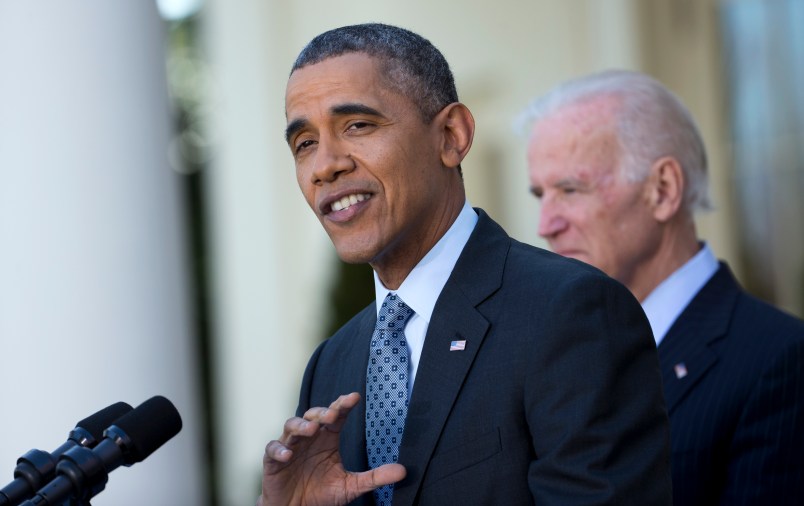The federal estimates on health care spending in the first quarter of 2014 have been all over the place. First, the Bureau of Economic Analysis estimated that health care spending boomed 9.9 percent, one of the biggest quarterly jumps in decades.
But on Wednesday, the BEA revised its estimate to a 1.4 percent decrease in health care spending, contributing heavily to the overall estimate that economic growth dropped 2.9 percent in the first quarter of the year.
Observers had attempted to reconcile the originally projected boom with the beginning of Obamacare coverage in January. Federal analysts even pointed to the law in an interview with Business Insider after the first estimate came out.
So what does the revised estimate, which shows health care spending on the decline, say about Obamacare? Maybe not much, Larry Levitt, vice president at the Kaiser Family Foundation, told TPM.
There are a few things to consider, Levitt said in an email. First, health care spending increased at an abnormally high rate in the fourth quarter of 2013: 5.6 percent. Second, the original estimate for the first quarter of 2014 was missing a key piece of information: the Commerce Department’s quarterly service survey. The downward revision was always expected once that data came in, Levitt said.
As Business Insider noted, that survey found revenue for hospitals, medical laboratories and outpatient care dropping.
Finally, in terms of Obamacare’s direct impact, roughly half of the 8 million people who enrolled in private coverage through the law signed up in March or later. For many of those people, their coverage didn’t kick in until April or May, meaning the effect of that coverage expansion probably will not be felt until the second quarter of 2014.
“It’s good that health spending isn’t surging as feared right now, but it’s way too soon to get complacent,” Levitt concluded. “The effects of the ACA’s insurance expansion are more likely to show up in the second quarter. And the improving economy will likely continue to put pressure on health costs.”
The White House’s Council of Economic Advisers drew some of the same conclusions. They pointed to the lack of the quarterly services survey in the initial estimate and said that they expect spending to increase once people who obtained coverage under Obamacare start to utilize their coverage.







PUHLEEZ! Health Care SHOULD BE NON-PROFIT… This is why the US Healt Care is so very DISMAL! AMA and others should stop bottomfeeding off the ill.
When more people can see a doctor fewer will have to go to an ER so they’ll be less money spent overall. Also, hospitals get less money, on average from people who have insurance than from those who don’t.
One of the main goals of healthcare reform was to lower the cost of healthcare…but I’m sure that the cons can pluck a turd from this rose garden.
Quit calling it “Obamacare.” It’s become a pejorative and is as sophomoric as “Democrat Party.”
President Obama said long ago he doesn’t mind it being called Obamacare. Though I use “ACA” myself when conversing with righty friends on the topic just to confuse and befuddle them.
I was at function a few weeks ago (lot of rich folks but many old school Dems-liberal elites I think they’re referred to as) sitting next to a righty friend, 50ish, nice guy really, just loves the righty world, both his parents are lefties so go figure. Anyway, he starts up with that Obamacare shit at the dinner table of 6 people. He carries on for a few minutes then his cousin, who owns a decent size business, quietly, calmly but absolutely took him down by saying his business has saved plenty of money since using ACA for his employees and the employees are happy with it, win-win. It was beautiful to behold and I got to keep my mouth shut and just watch. Of course this in KY so we have a pretty good system here. I have ACA myself and it’s fine.